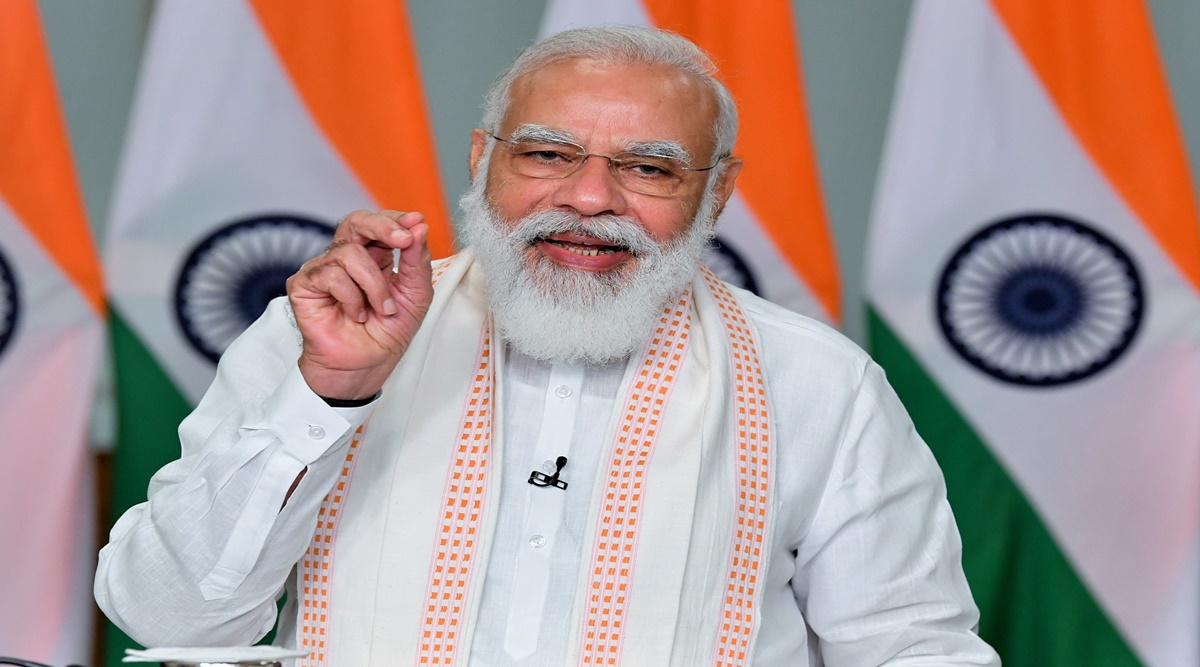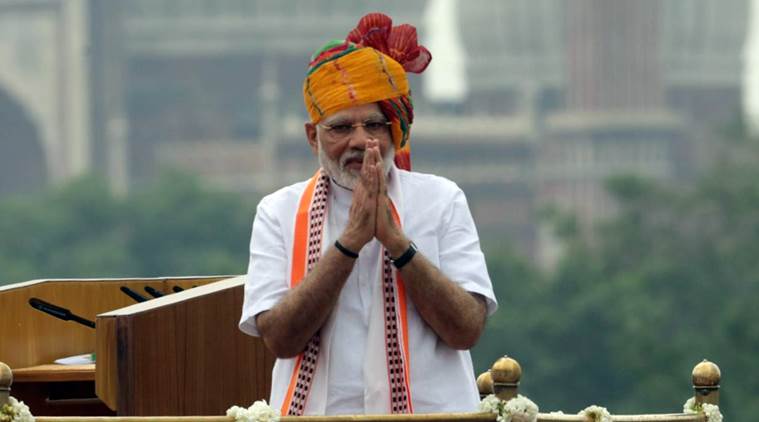 Prime Minister Narendra Modi (Source: PIB)
Prime Minister Narendra Modi (Source: PIB)PM Modi Speech on NEP 2020 HIGHLIGHTS: Addressing students at the School Education Conclave, Prime Minister Narendra Modi on Friday talked about the changes the National Education Policy (NEP) 2020 will bring. “The New education policy will sow the seeds for starting a new era, will give new direction to 21st century India,” said Modi
The prime minister added that the focus needs to be on the implementation of the policy. “Our work has just begun; National Education Policy has to be implemented equally effectively,” he said.
Within the past one week, the Education Ministry has received over 15 lakh suggestions on its implementation, said PM while addressing the conclave on ‘School Education in 21st Century’ organised by the Ministry of Education as a part of Shiksha Parv (festival of education). The Prime Minister had earlier talked about the higher education part of the NEP during a conclave on ‘transformational reforms in higher education’.
The Shiksha Parv is being celebrated from September 8-25. Several webinars and conferences are taking place to discuss the action plan of the NEP 2020.
 PM Modi (Express Photo by Neeraj Priyadarshi)
PM Modi (Express Photo by Neeraj Priyadarshi)
The National Education Policy 2020 is a way to fulfill the new aspirations and new hopes of our new India. It needs to be implemented effectively across the country and we need to do it together: Prime Minister Narendra Modi
Along with learning, we also have to unlearn a lot. By 2022, every student will be evolved into the new education policy. I urge all teachers, NGOs, organisations, students, and parents to join the national mission. With your support the nation will implement the NEP successfully, said Modi
Language is just a mode of study and not a study in itself. We need to see that most of the energy of students should not be spent on learning the language rather than the subject. A child should understand what they are taught. In a lot of countries, elementary education is imparted in their mother tongue. It is a known fact that students learn better in the language they speak at home. In rural areas, parents are not associated with a child's learning because of the mode of teaching at school. At least till class 5, students should be taught in the mother tongue. Along with the mother tongue, students will be taught international languages including English but Indian languages will also be promoted, said PM.
One of the major reasons behind the drop-out ratio is that students do not have the freedom of choosing their own subject but NEP will give the same. Now, students will not have to be limited to the watertight boundaries of commerce, science, and humanities and will chose any subjects they want to choose. It will bring the focus of marks and mark sheet based education back to learning based education, says Modi.
NEP will reduce the syllabus and make learning a fun-based and complete experience. we have developed a new curriculum framework. By 2022, our students will join the new curriculum and step towards the new curriculum. It will be a future-ready and scientific curriculum. The future will have new skills including critical thinking, creativity, communication, and curiosity.
When a student will start a question, his or her curiosity will be built and they will start learning on their own. If a student will look at the practical aspect of their knowledge, they will learn better. A large section of students is kept away from the practical aspect of education. Many vocational trainings are often looked down upon. We need to sensitise our students, said PM.
To ensure better learning, we need to ensure that study is not just limited to the walls of the classroom but is interlinked with the outside world as well, says Modi. Citing the example of Ishwarchandra Vidyasagar he said when education is interlinked with the outside world, it would impact the life of students as well as the entire society, he said.
To take the journey of 'lean-to- read' to 'read-to-learn', we are taking steps to strengthen the foundation literacy. A student who is in class 3 can read at least 30-35 words in one minute, says Modi.
The National Education Policy 2020 is a way to fulfill the new aspirations and new hopes for our new India. It needs to be implemented effectively across the country and we need to do it together, said Prime Minister Narendra Modi
Ministry of Education has received over 15 lakh suggestions from teachers on the NEP 2020 within a week at the mygov portal. These suggestions will ensure better implementation of the policy, said Modi.
While nothing has remained the same in the past three decades, India's education system had remained unchanged. This was critical to bring a new education policy but it is only a beginning. Now we need to ensure proper implementation of the policy. The questions on how the policy will be implemented are not only important but also critical, says Modi.
This is the foundation of the future of India. This is the moment which is planting the seeds of a new era. The NEP will give a direction to 21st century India, says Modi.
Minister of Education Ramesh Pokhriyal Nishak welcomes the prime minister, says over 15 lakh schools associated with the event and crores of students, teachers, and parents joined the same via videoconferences.
NEP brings several changes to the school education including universalisation of Early Childhood Care and Education (ECCE) for children up to the age 8; 10+2 structure of school curricula is to be replaced by a 5+3+3+4 curricular structure; integrating curriculum to 21st-century skills, mathematical thinking and scientific temper; development of new comprehensive National Curricular Framework for School Education; national professional standards for teachers; assessment reforms and 360-degree holistic progress card of the child; and vocational integration from class 6 onwards.
While addressing the virtual grand finale of the ‘Smart India Hackathon’ earlier, Modi had said, “India’s National Education Policy reflects the spirit of new India. We are shifting from the burden of the school bag, which does not last beyond school. To the boon of learning which helps for life. From simply memorising to critical thinking. The 21st century is the era of knowledge, learning, and innovation.”
The “Shiksha Parv” (education festival) is being celebrated from September 8-25 to felicitate teachers and take the New Education Policy forward. Various webinars, virtual conferences and conclaves on several aspects of the NEP are being organised across the country
Earlier Prime Minister Shri Narendra Modi also delivered the inaugural address at the ‘Conclave on Transformational Reforms in Higher Education' where he talked about higher education. Now he will talk about NEP with respect to school education.
Prime Minister Narendra Modi will address the conclave on 'School Education in 21st Century' under the National Education Policy (NEP) 2020 at 11 am today, through video conferencing.